Graham Reid | | 4 min read
Meat Puppets: No Longer Gone (from Forbidden Places)

In the more strange corners of the
Eighties on the SST label there were -- between the dreadful
Zappa-clown Zoogz Rift and solo projects by various Violent Femmes –
thrilling bands like firehose, Black Flag and Husker Du. And the very
wonderful Meat Puppets, a trio out of Phoenix, whose brains seemed
completely fried by drugs, comics and the desert sun.
And in that post-punk, pre-grunge
period where guitar solos were outlawed, they didn’t care. They
weren’t British, they were a band from Arizona which had grown up
seeing Journey and ZZ Top but had created their own punk.
They’d fire up on all three cylinders
and let rip with lyrics like “ivory whales high on corn bread,
wind-filled sails fly to the doorstep,” and plaster that over
brittle psychedelic punk guitars.
Brilliant, but I guess you had to be
there.
Eventually people were, and for their
growing audience they delivered ripping albums like Mirage (1987) and
Too High to Die ('94) which appeared after they had been on Nirvana's
Unplugged MTV session.
After Too High, many people have lost
track of them, but in '99 Ryko reissued half a dozen Meat Puppets
albums – all their early SST albums up to Monsters ('89), and their
first official live album. And with Ryko’s now customary attention
to detail, each enhanced disc came with bonus tracks, videos for the
ROM, a booklet outlining the album's background, notes from the band
about the recordings, lyrics (whoohoo!?) and - the best part, in case
we have forgotten - plenty of psychedelic weirdness for the head.
Listening back, you can’t help be
struck that, psychedelic though they were, there was never much flab
from guitarist Curt Kirkwood, his brother Cris (bass) and drummer
Derrick Bostrom.
Guitarist Curt (hailed by various Pearl
Jammers, dead Nirvana and Soundgarden) was like the Tom Verlaine of
trip-rock. He was tight and focused, angular in
approach but always following some inner logic of his own.
Marry that
to lyrics inspired by acid and Arizona deserts, the Old Testament and
a Seventies record collection, plus a genuine love and ability at a
peculiar kind of speed metal hillbilly pre-grunge, and you just know
they had to become big.
They didn't however, instead they
became one of those bands which prove that Reasonably Well Known (and
Respected) isn’t the same as Big. Their slightly detached quality,
lack of a few killer punches in their career (Huevos in '87 was a
pre-Nirvana Unplugged sales-high but isn't as strong as previous or
later albums) and the odd stumble into lunken speed-boogie all held
them back.
Not that they could care, they have
just kept making albums and Forbidden Places in '91 (which included the live favourites Sam, Whirlpool, PopSkull and No Longer Gone) was a late career high for the band which split up ('96-'99) . . . after
which there was a line-up change (drummer Bostrom out) then a
four-year hiatus from '02.
But the best of the Meat Puppets –
when they were daring, innovative and different, happened in those
years prior to that television appearance with Nirvana.
The self-titled Meat Puppets collection
for Ryko included their '82 debut EP, first album and other period
pieces – and comes with cover notes which say “Be forewarned: the
Meat Puppets debut is completely unlike anything else in their
catalogue”. That's true. (Whether it’s also quite “unlike
anything in the entire history of recorded music” is another
matter.)
All the elements of their later
developments are there, but it’s also tediously flat tack in some
places - and the trip aspects sit oddly with the primitive, country
guitar picking. But their version of Tumbin’ Tumbleweeds showed
they were unconventional in an unconventional world.
What sets them apart are the curious
country turns, the often impenetrable and funny lyrics by the
brothers Kirkwood and Bostrom, and a guitarist who
sometimes plays as if he’s just been pardoned out of hell and is
here to enjoy life. But otherwise their early stuff is tough call.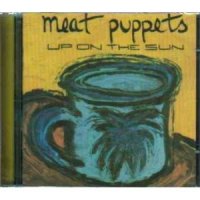
Things take shape around Up on the Sun
('84) and Out My Way ('86). By then they’d turned the country
aspects into fine, melancholy, electric-guitar ballads, the punk
discipline made for a finely honed, smoothly gear’n’chord
changing outfit.
The lyrics also get reigned in to
spacious colourist stuff and some deeply felt emotions, some of them
about those which happen when you are straight.
They were moving around on all fronts,
and Up on the Sun includes a bizarre, synth’n’marimba version of
the album track Hot Pink.
Out My Way is their mini-album of the
same name, with seven bonus tracks, and is archetypal Puppets: the
rare combination of disciplined and country and classic rock chord
changes. And a furious cover of Good Golly Miss Molly. It’s the
useful intro.
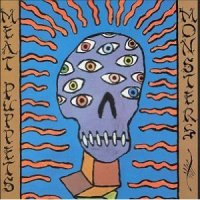 Mirage, their fifth album, was the
finest of their early period: the speed slowed a little to allow more
expressive guitars and vocals, and Monsters (their last for SST) was
the natural progression. They sound at their most approachable.
Mirage, their fifth album, was the
finest of their early period: the speed slowed a little to allow more
expressive guitars and vocals, and Monsters (their last for SST) was
the natural progression. They sound at their most approachable.
And Live in Montana, recorded in '88,
delivers some of their best material (Touchdown King, Party Till the
World Obeys, Plateau) and some odd covers (Roy Orbison’s Blue
Bayou, Black Sabbath's Paranoid and Sweet Leaf) like a (sometimes)
well-oiled, or at least well-lubricated machine.
This is an awful lot of Meat Puppets to assimilate but they seriously were, at times, far too great to ignore. Like
Deadheads on a country-speed-grunge trip.
Find the right Meat Puppets and it is,
as they warn, “ice on the wings, and we’re flying."


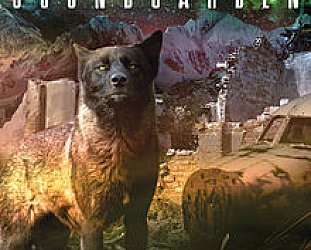

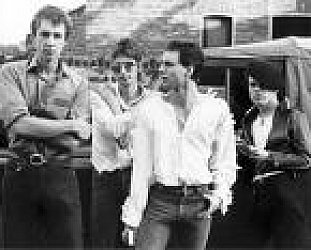
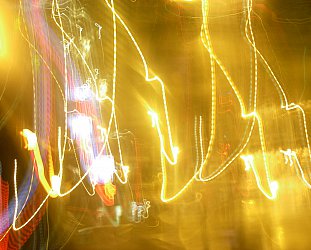
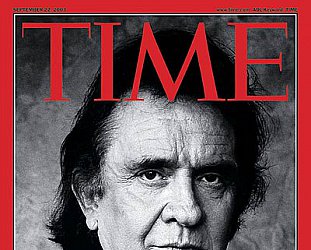
El Sketcho - Sep 6, 2010
Cripes, I remember the Meat Puppets at the Powerstation as one of the better gigs I attended that decade!
Savepost a comment